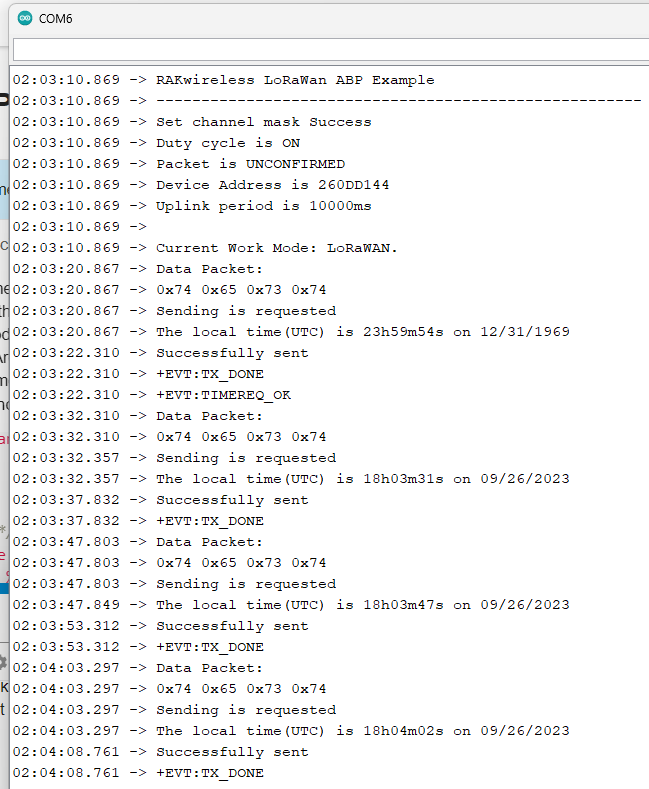I have already managed to update the date and time of the rak3172 device in OTAA join mode, without much difficulty. Now I’m trying to do the same for the ABP join mode, but the problem is that it simply doesn’t recognize the downlink to update the date and time or to confirm the message. First I tried using the AT command and then with the Arduino IDE, the error happened in both. So I would like to know if it is possible to update the date and time in ABP mode, I used the latest version of the at command firmware (4.0.6) and the latest Arduino library.
/***
* This example shows LoRaWan protocol joining the network in ABP mode, class A, region US915.
* Device will send uplink every 5 seconds.
***/
#define ABP_PERIOD (5000)
/*************************************
LoRaWAN band setting:
RAK_REGION_EU433
RAK_REGION_CN470
RAK_REGION_RU864
RAK_REGION_IN865
RAK_REGION_EU868
RAK_REGION_US915
RAK_REGION_AU915
RAK_REGION_KR920
RAK_REGION_AS923
*************************************/
#define ABP_BAND (RAK_REGION_AU915)
/** Packet buffer for sending */
uint8_t collected_data[64] = { 0 };
void recvCallback(SERVICE_LORA_RECEIVE_T * data)
{
if (data->BufferSize > 0) {
Serial.println("Something received!");
for (int i = 0; i < data->BufferSize; i++) {
Serial.printf("%x", data->Buffer[i]);
}
Serial.print("\r\n");
}
}
/*************************************
* enum type for LoRa Event
RAK_LORAMAC_STATUS_OK = 0,
RAK_LORAMAC_STATUS_ERROR,
RAK_LORAMAC_STATUS_TX_TIMEOUT,
RAK_LORAMAC_STATUS_RX1_TIMEOUT,
RAK_LORAMAC_STATUS_RX2_TIMEOUT,
RAK_LORAMAC_STATUS_RX1_ERROR,
RAK_LORAMAC_STATUS_RX2_ERROR,
RAK_LORAMAC_STATUS_JOIN_FAIL,
RAK_LORAMAC_STATUS_DOWNLINK_REPEATED,
RAK_LORAMAC_STATUS_TX_DR_PAYLOAD_SIZE_ERROR,
RAK_LORAMAC_STATUS_DOWNLINK_TOO_MANY_FRAMES_LOSS,
RAK_LORAMAC_STATUS_ADDRESS_FAIL,
RAK_LORAMAC_STATUS_MIC_FAIL,
RAK_LORAMAC_STATUS_MULTICAST_FAIL,
RAK_LORAMAC_STATUS_BEACON_LOCKED,
RAK_LORAMAC_STATUS_BEACON_LOST,
RAK_LORAMAC_STATUS_BEACON_NOT_FOUND,
*************************************/
void sendCallback(int32_t status)
{
if (status == RAK_LORAMAC_STATUS_OK) {
Serial.println("Successfully sent");
} else {
Serial.println("Sending failed");
}
}
void setup()
{
Serial.begin(115200, RAK_AT_MODE);
delay(2000);
Serial.println("RAKwireless LoRaWan ABP Example");
Serial.println("------------------------------------------------------");
if(api.lorawan.nwm.get() != 1)
{
Serial.printf("Set Node device work mode %s\r\n",
api.lorawan.nwm.set(1) ? "Success" : "Fail");
api.system.reboot();
}
// ABP Device Address MSB first
uint8_t node_dev_addr[4] = ABP_DEVADDR;
// ABP Application Session Key
uint8_t node_app_skey[16] = ABP_APPSKEY;
// ABP Network Session Key
uint8_t node_nwk_skey[16] = ABP_NWKSKEY;
//adicionado
uint16_t maskBuff = 0x0001;
api.lorawan.mask.set(&maskBuff);
if (!api.lorawan.njm.set(RAK_LORA_ABP)) // Set the network join mode to ABP
{
Serial.printf("LoRaWan ABP - set network join mode is incorrect! \r\n");
return;
}
if (!api.lorawan.daddr.set(node_dev_addr, 4)) {
Serial.printf("LoRaWan ABP - set device addr is incorrect! \r\n");
return;
}
if (!api.lorawan.appskey.set(node_app_skey, 16)) {
Serial.printf("LoRaWan ABP - set application session key is incorrect! \r\n");
return;
}
if (!api.lorawan.nwkskey.set(node_nwk_skey, 16)) {
Serial.printf("LoRaWan ABP - set network session key is incorrect! \r\n");
return;
}
if (!api.lorawan.band.set(ABP_BAND)) {
Serial.printf("LoRaWan ABP - set band is incorrect! \r\n");
return;
}
if (!api.lorawan.deviceClass.set(RAK_LORA_CLASS_A)) {
Serial.printf("LoRaWan ABP - set device class is incorrect! \r\n");
return;
}
if (!api.lorawan.adr.set(false)) {
Serial.printf("LoRaWan ABP - set adaptive data rate is incorrect! \r\n");
return;
}
if (!api.lorawan.rety.set(0)) {
Serial.printf("LoRaWan ABP - set retry times is incorrect! \r\n");
return;
}
if (!api.lorawan.cfm.set(0)) {
Serial.printf("LoRaWan ABP - set confirm mode is incorrect! \r\n");
return;
}
/** Check LoRaWan Status*/
Serial.printf("Duty cycle is %s\r\n", api.lorawan.dcs.get()? "ON" : "OFF"); // Check Duty Cycle status
Serial.printf("Packet is %s\r\n", api.lorawan.cfm.get()? "CONFIRMED" : "UNCONFIRMED"); // Check Confirm status
uint8_t assigned_dev_addr[4] = { 0 };
api.lorawan.daddr.get(assigned_dev_addr, 4);
Serial.printf("Device Address is %02X%02X%02X%02X\r\n", assigned_dev_addr[0], assigned_dev_addr[1], assigned_dev_addr[2], assigned_dev_addr[3]); // Check Device Address
Serial.printf("Uplink period is %ums\r\n", ABP_PERIOD);
Serial.println("");
api.lorawan.registerRecvCallback(recvCallback);
api.lorawan.registerSendCallback(sendCallback);
}
void uplink_routine()
{
if (!service_lora_set_timereq(1)){
Serial.printf("LoRaWan ABP - set time_req mode is incorrect! \r\n");
}
/** Payload of Uplink */
uint8_t data_len = 0;
collected_data[data_len++] = (uint8_t) 't';
collected_data[data_len++] = (uint8_t) 'e';
collected_data[data_len++] = (uint8_t) 's';
collected_data[data_len++] = (uint8_t) 't';
Serial.println("Data Packet:");
for (int i = 0; i < data_len; i++) {
Serial.printf("0x%02X ", collected_data[i]);
}
Serial.println("");
/** Send the data package */
if (api.lorawan.send(data_len, (uint8_t *) & collected_data, 2, true, 1)) {
Serial.println("Sending is requested");
} else {
Serial.println("Sending failed");
}
}
void loop()
{
static uint64_t last = 0;
static uint64_t elapsed;
if ((elapsed = millis() - last) > ABP_PERIOD) {
uplink_routine();
last = millis();
}
//Serial.printf("Try sleep %ums..", ABP_PERIOD);
api.system.sleep.all(ABP_PERIOD);
//Serial.println("Wakeup..");
}
//log serial arduino
08:28:35.763 → RAKwireless LoRaWan ABP Example
08:28:35.796 → ------------------------------------------------------
08:28:35.796 → Duty cycle is ON
08:28:35.796 → Packet is UNCONFIRMED
08:28:35.796 → Device Address is 8B****80
08:28:35.796 → Uplink period is 5000ms
08:28:35.796 →
08:28:35.796 → Current Work Mode: LoRaWAN.
08:28:40.794 → LoRaWan ABP - set time_req mode is incorrect!
08:28:40.794 → Data Packet:
08:28:40.794 → 0x74 0x65 0x73 0x74
08:28:40.828 → Sending is requested
08:28:44.592 → Sending failed
08:28:44.592 → +EVT:SEND_CONFIRMED_FAILED(4)
08:28:44.592 → +EVT:TIMEREQ_FAILED
08:28:49.623 → LoRaWan ABP - set time_req mode is incorrect!
08:28:49.623 → Data Packet:
08:28:49.623 → 0x74 0x65 0x73 0x74
08:28:49.623 → Sending is requested
08:28:53.220 → Sending failed
08:28:53.220 → +EVT:SEND_CONFIRMED_FAILED(4)
08:28:53.220 → +EVT:TIMEREQ_FAILED
//log server
{
“params”: {
“rx_time”: 1695731338.6179185,
“port”: 2,
“duplicate”: false,
“radio”: {
“gps_time”: 1379766556600,
“delay”: 0.05879998207092285,
“datarate”: 2,
“modulation”: {
“bandwidth”: 125000,
“type”: “LORA”,
“spreading”: 10,
“coderate”: “4/5”
},
“hardware”: {
“status”: 1,
“chain”: 1,
“tmst”: 3632774500,
“snr”: -0.5,
“rssi”: -110,
“channel”: 4,
“gps”: {
“lat”: -20.42013931274414,
“lng”: -54.56623840332031,
“alt”: 727
}
},
“time”: 1695731338.6179185,
“freq”: 916,
“size”: 18
},
“counter_up”: 3,
“lora”: {
“header”: {
“class_b”: false,
“confirmed”: true,
“adr”: false,
“ack”: false,
“adr_ack_req”: false,
“version”: 0,
“type”: 4
},
“mac_commands”: [
{
“DeviceTimeReq”: {}
}
]
},
“payload”: “dGVzdA==”,
“encrypted_payload”: “8IFprQ==”
},
“meta”: {
“network”: “358b679dd88d47948f6e108677b4b79a”,
“packet_hash”: “9fa42eb9e7dcfb1e2135d022cf1e2a72”,
“application”: “0000000000000000”,
“device_addr”: “8b **** 80”,
“time”: 1695731338.693,
“device”: “ac************a0”,
“packet_id”: “e5c2e1b6e95648a7d8a3bb6bb5bbb7bb”,
“gateway”: “b0fd0b70002a0000”
},
“type”: “uplink”
}
{
“params”: {
“payload”: “”,
“radio”: {
“gps_time”: 1379766556600,
“delay”: 0.05879998207092285,
“datarate”: 2,
“modulation”: {
“bandwidth”: 500000,
“type”: “LORA”,
“coderate”: “4/5”,
“spreading”: 10,
“inverted”: true
},
“datr”: “SF10BW500”,
“hardware”: {
“status”: 1,
“chain”: 0,
“power”: 26,
“tmst”: 1351250916,
“snr”: -0.5,
“rssi”: -110,
“channel”: 4,
“gps”: {
“lat”: -20.42013931274414,
“lng”: -54.56623840332031,
“alt”: 727
}
},
“time”: 1695731343.6179185,
“freq”: 925.7,
“size”: 18
},
“counter_down”: 100,
“lora”: {
“header”: {
“confirmed”: false,
“adr”: true,
“ack”: true,
“version”: 0,
“type”: 3,
“pending”: false
},
“mac_commands”: [
{
“DeviceTimeAns”: {
“seconds”: 1379766556,
“fractional_second”: 158
}
},
{
“DutyCycleReq”: {
“MaxDCycle”: 0
}
},
{
“RXParamSetupReq”: {
“Frequency”: 9233000,
“DLsettings”: {
“RX2DataRate”: 8,
“RX1DRoffset”: 0
}
}
}
]
},
“port”: null,
“encrypted_payload”: “”
},
“meta”: {
“network”: “358b679dd88d47948f6e108677b4b79a”,
“packet_hash”: “9fa42eb9e7dcfb1e2135d022cf1e2a72”,
“application”: “0000000000000000”,
“device_addr”: “8b* *** 80”,
“time”: 1695731341.144,
“device”: “ac************a0”,
“packet_id”: “e5c2e1b6e95648a7d8a3bb6bb5bbb7bb”,
“gateway”: “b0fd0b7000670000”
},
“type”: “downlink”
}
